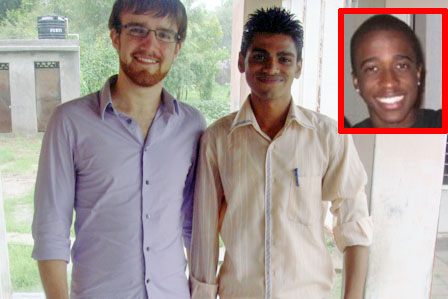Small ’13, Byer ’12 Educate Rural Communities about Mental Health Care

(Article submitted by Raghu Appasani)
Many Wesleyan students have ambitions to create positive social change and make an impact. This summer, two Wesleyan undergraduates, Lennox Byer ’12 and Alexander Small ’13, travelled to the state of Gujarat in India. Specifically, they travelled to the district of Vadodara where they resided at the Sumandeep Vidyapeeth University (MINDS collaborator) as MINDS Ambassadors.
Lennox and Alex have been core members of The MINDS (Mental Illness & Neurological Disorders) Foundation since its incorporation in 2010. The MINDS Foundation is an organization founded by Wesleyan undergraduate Raghu Appasani ’12.
The organization has a persistent commitment to taking a grassroots approach to eliminating stigma and providing educational, financial, medical, and moral support for patients suffering from mental illness in developing countries.
The volunteers implemented Phase I of the organization’s four-phase grassroots program. Phase I involves educating the rural communities about mental health care, how to pick up on symptoms, various disorders, and where to go for resources. Byer and Small travelled to three villages during their time in India and screened a documentary informing ~100 people in each village about mental health. The screening was followed up with a short lecture by a psychiatrist and surveys taken by the volunteers.
The program reached a large number of people, especially relative to the size of the village.
“Many of the residents were attentive and curious, and everyone went home with a pamphlet on mental illness,” Small says. “Hopefully this initial program will result in a tangible difference for the perceptions of the village’s population and therefor an improvement in the quality of treatment and life for those suffering from mental illness in Gamdi.”
According to Byer, “the most assuring things was knowing that as we increased awareness we would be able to treat even those who lived in the tents along the side of the roads. Knowing that I live such a comfortable life in the USA has really alerted and motivated to give back, and in the context of MINDS, especially to those suffering with mental illness who have so much more to deal with than just their sickness.”
Phase I continues to run and data continues to be analyzed by a MINDS-hired local social worker. This upcoming winter break, another group of MINDS Ambassadors will travel to India to implement Phase II, which involves diagnostic screening camps in the villages. If you would like to get involved with The MINDS Foundation or volunteer, visit www.mindsfoundation.org.

